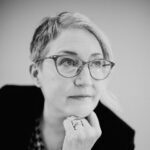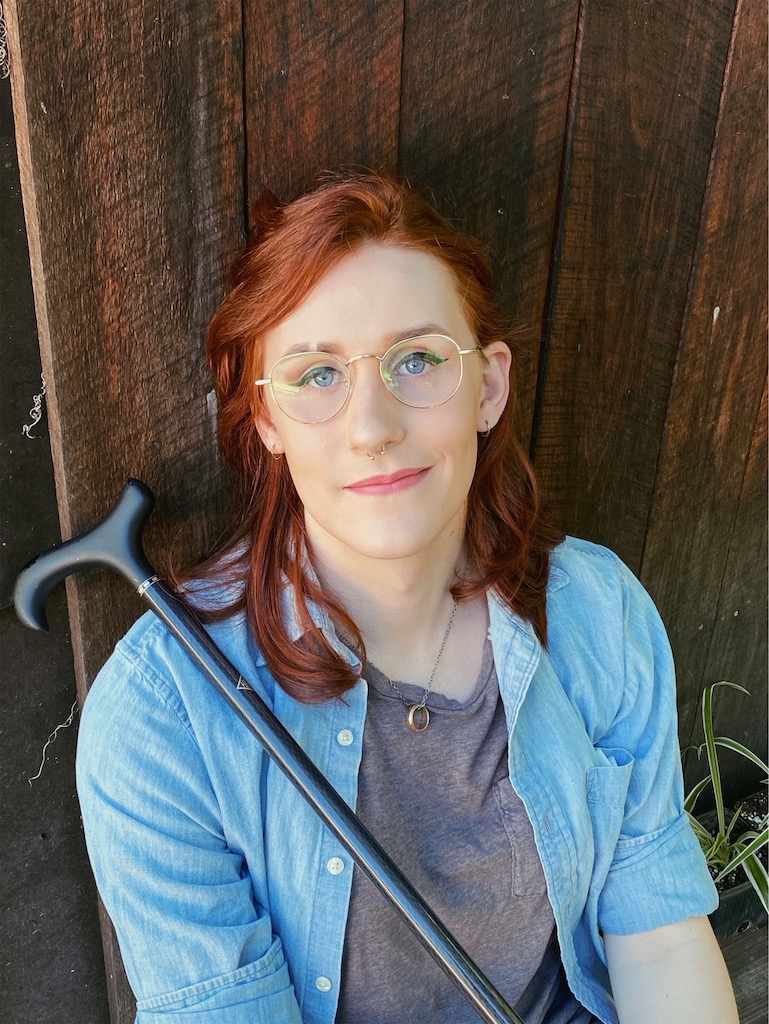Summer 2022
4
Less Lonely Together:
A Conversation with torrin a. greathouse
Sydney Elliott, Managing Editor (Class of 2015)
Less Lonely Together:
A Conversation with torrin a. greathouse

Sydney Elliott
Managing Editor
Class of 2015
I would hope that these poems can make a reader feel less lonely.
–torrin a. greathouse, interview, NPR
I always welcome the opportunity to profile new faculty. This year, finally returning to the PLU campus after two summers, it feels even more delicious to dig into the life of poet torrin a. greathouse (she/her/they/them), a transgender cripple-punk and new member of the RWW family.
greathouse is a graduate of the University of Minnesota’s MFA program. Her debut collection, Wound from the Mouth of a Wound (Milkweed 2020), is an exploration of beauty and the intersection of her identities and won the 2022 Kate Tufts Discovery Award. greathouse has been published in other notable publications, such as the New York Times, the Kenyon Review, and the Academy of American Poets Poem-a-Day series.
torrin graciously agreed to answer a few questions about joining the RWW faculty.

Sydney Elliott: What was your reaction when you found out you were joining the RWW family?

torrin a. greathouse
torrin a. greathouse: I was, honestly, a little stunned. In the current academic job market, it's a pretty rare opportunity to begin teaching straight out of grad school, but I'm confident in my abilities and so excited to begin working with the students and faculty. Rick Barot has put together a really incredible list of professors at RWW, and I feel deeply honored to be joining them.
SE: In your RWW faculty statement, you write, "I encourage writers to court failure in their writing process, treating each draft as a space for experimentation, for excess, and for bold choices they might otherwise never make." I find this very useful and exciting. Can you elaborate further?
tg: It's my stance that good writing rarely comes from avoiding risk. There's a famous Brian Eno quote, "CD distortion, the jitteriness of digital video, the crap sound of 8-bit—all of these will be cherished and emulated as soon as they can be avoided. It’s the sound of failure: so much modern art is the sound of things going out of control, of a medium pushing to its limits and breaking apart." I think that writing, too, finds beauty when pushed to its limits, when a metaphor or textual strategy or formal gesture begins to scrape the edges of failure. Until we begin to explore the outer limits of our own poetics, I don't believe we're fully aware of our own creative capabilities.
“I think that writing, too, finds beauty when pushed to its limits, when a metaphor or textual strategy or formal gesture begins to scrape the edges of failure.”
SE: What can participants look forward to in having you join the faculty?
tg: I'm bringing to this faculty a deep interest in formalism, but also in breaking and queering received forms. I'm also excited to open and expand conversations around trans poetics, disability poetics, and visual poetic forms. In addition, I've spent the last three years researching and workshopping alternate models for the creative writing workshop, in the hopes of creating more inclusive and equitable spaces. I'm looking forward to continuing that work in concert with other members of the RWW faculty committed to the same work.
SE: What do you look forward to the most this summer at our first in-person residency in two years?
tg: First and foremost, getting to spend time with the students and faculty, getting to break bread together. To get to engage in all the parts of community building that are so difficult to foster in a digital space.
We look forward to breaking bread with you, torrin! A warm welcome to RWW!
